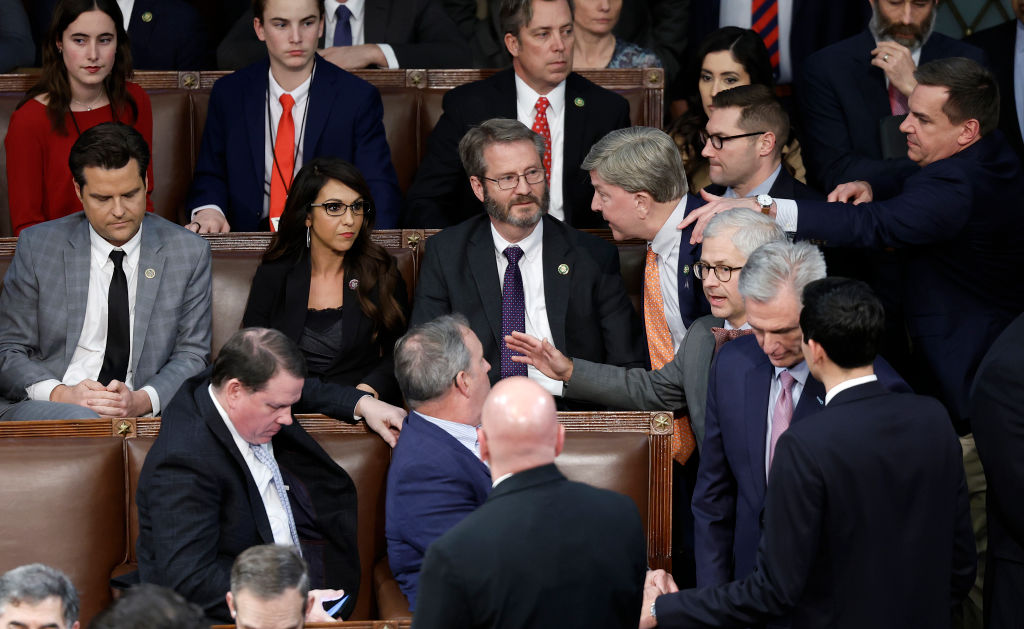Ugly. Chaotic. Disruptive. These and other pejoratives graced headlines last week as House Republicans wrestled with the question of who would be the next speaker of the House of Representatives.
One missing descriptor? Necessary.
After five days of push and pull between different factions of the Republican House majority, Kevin McCarthy of California won his long-sought post as speaker. But as the negotiations wound down and McCarthy inched close to the gavel, he and his allies pivoted their narrative from anger to aspiration.
We started to hear: “this is what democracy looks like” and “it’s not always pretty.” The begrudging tone suggested they weren’t thrilled with the concessions McCarthy had brokered with Representative Chip Roy and fourteen other Republicans who had been withholding their votes. But ultimately those changes will revitalize an institution that was growing brittle under the weight of the speaker’s power.
Among the concessions is the now-restored single-member motion to vacate the speaker’s chair, the main accountability mechanism for any sitting speaker. McCarthy also agreed to diversify membership on the powerful House Rules Committee, the last stop for all legislation before bills go to the floor for a vote. Other rules changes cap defense spending, reform the appropriations process, and incentivize spending cuts. A particularly clever rule introduced by Representative Thomas Massie would trigger an automatic 2 percent cut to the federal budget on continuing budget resolutions to prevent government shutdowns. (This auto-sequestration is meant to serve as an disincentive for those who refuse to balance the budget.)
Critics ranging from Democrat Representative Juaquin Castro to Republican Matt “Never Kevin” Gaetz have remarked that these changes strip the speakership of essentially any power at all.
And that’s the point. Nancy Pelosi was the most powerful House speaker since the notorious Joseph Cannon a hundred years ago. Through brinksmanship, Chip Roy and his band of Republicans have remade the office of the speaker, making the House of Representatives more small-d democratic than it has been in decades.
McCarthy will not have the raw power of Pelosi and her predecessors to bully his caucus into submission. Rank-and-file members will have more of a say in what comes to the floor. Hell, they’ll even get to offer amendments, a novelty for those familiar with Pelosi’s affinity for the “closed rule.” Freshman won’t be automatically relegated to the back bench and members with minority opinions will be able to act on them, not just pay lip service on Twitter. Bipartisan legislation will even have a possibility of making it to the floor for a vote!
Last Friday, before agreeing to vote “present” and allowing McCarthy to win the speakership on his fifteenth vote, Matt Gaetz told the press “he was running out of things to ask for.” He described the changes as a “straitjacket” and made clear that McCarthy’s victory would be almost entirely pyrrhic.
But Chip Roy, the lead negotiator, put it best: “some of the tensions you saw on display… we need a little of that. We need a little of this sort of breaking the glass in order to get us to the table, in order to get us to fight for the American people and to change the way this place is dysfunctional.”
He’s right. The House of Representatives is a better place thanks to last week’s theatrics.
Americans who watched the proceedings play out were treated to an uncharacteristically open House. The lack of speaker and lack of rules meant the only option was to hold roll call after roll call until a speaker emerged or members agreed to adjourn for the night.
It also meant that C-SPAN had freer rein over its daily broadcasts of Congress, showing viewers how the House works in real-time, without the scripted “debates” or canned remarks that normally dominate the proceedings. Instead, Americans saw unlikely pairings like New York Democrat Alexandria Ocasio Cortez chatting with the likes of Arizona Republican Paul Gosar. Those who stayed up late were rewarded with a very human moment of frustration as two members nearly came to near blows, and the palpable sigh of relief when Gaetz relented and McCarthy prevailed.
As Republicans haggled to make the House a more democratic institution, the rest of us got an unvarnished look at democracy in action. And democracy seems to be catching. Representative Mark Pocan introduced a bill this week that would allow C-SPAN to continue broadcasting the House floor as it did last week. He has likely support from at least one colleague across the aisle. Chip Roy said: “It was a good thing for people to be able to see the inner workings.”





















